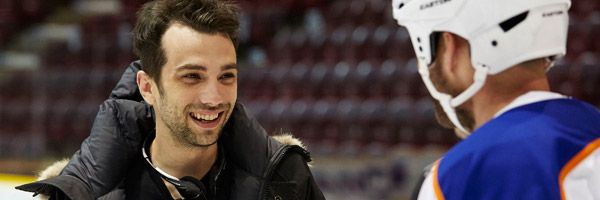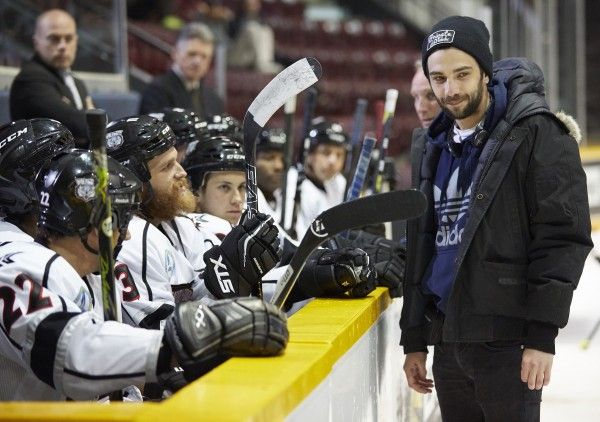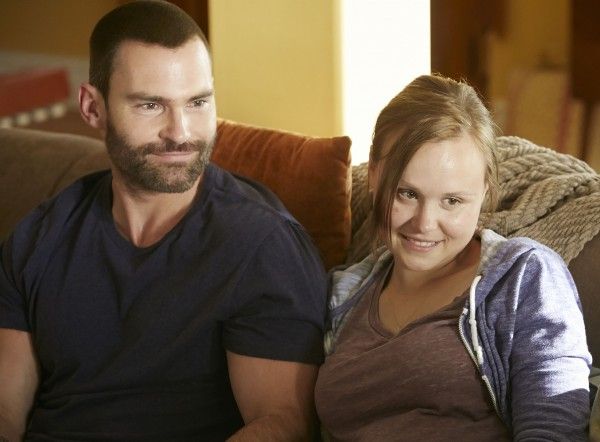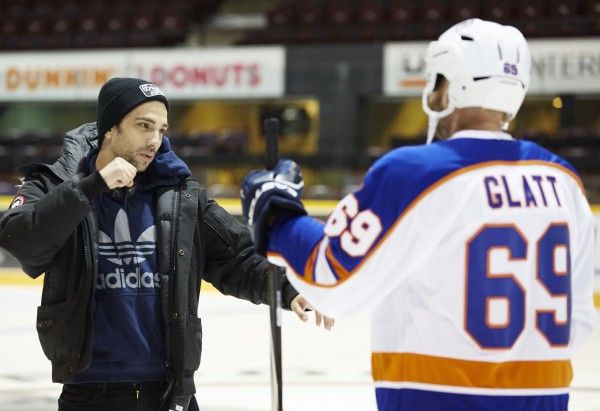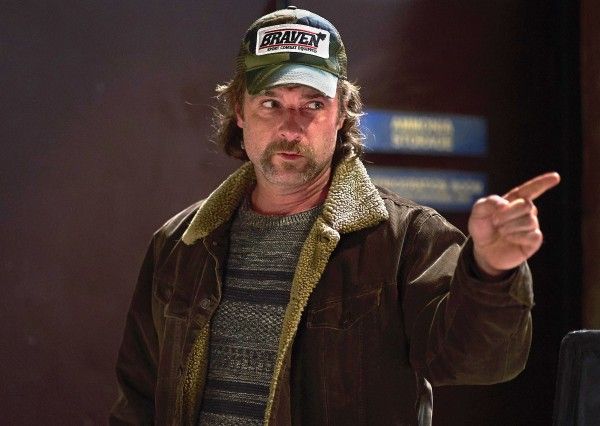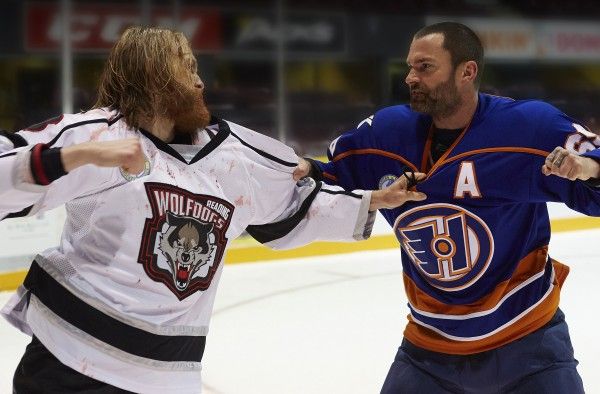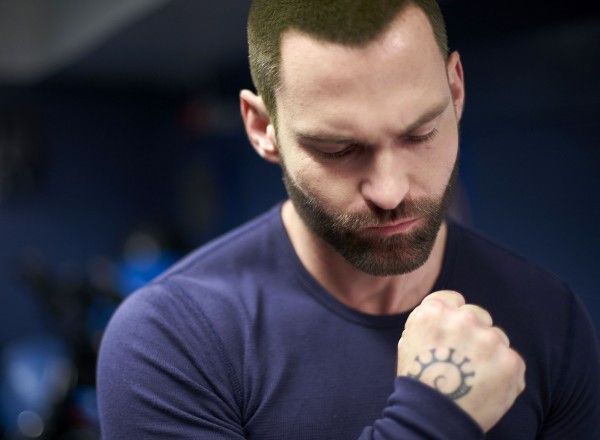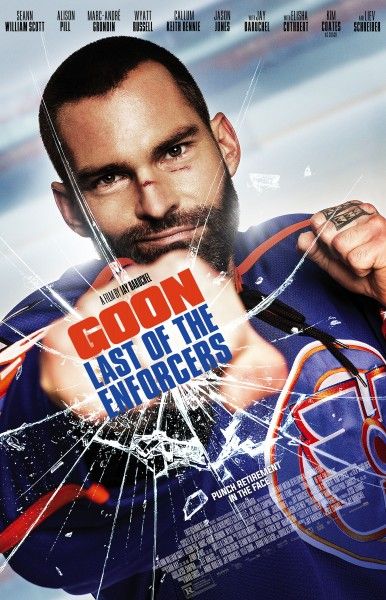Even though discussion of a sequel to Goon began early into production of the original movie, released in 2011, it has taken a few years for Goon: Last of the Enforcers to finally reach audiences. This time with co-writer Jay Baruchel at the helm, Goon 2 follows hockey enforcer Doug Glass (Seann William Scott) as he comes to terms with being forced to give up his aspirations on the ice, after one too many injuries. His pregnant wife Eva (Alison Pill) has urged him to settle into a career as an insurance salesman, but Doug just can’t turn his back on the possibility of reclaiming his former glory with the Highlanders.
During this 1-on-1 phone interview with Collider, actor Jay Baruchel talked about when they realized a sequel could be a reality, how the film evolved, making sure the story respected both the audience and the characters, the experience of directing his first feature, what he learned from friends and family screenings, and the many deleted scenes. He also talked about how well How to Train Your Dragon 3 is coming along and what fans can expect, when he realized that he wanted to be a director, the filmmakers that he’s learned from, and adapting the graphic novel Random Acts of Violence for him to direct.
Collider: Goon wasn’t what anyone would call a huge hit at the box office, but it’s a cool, fun movie. When did you actually realize that you might be able to make a sequel?
JAY BARUCHEL: As soon as it came out in Canada. The “It was not a smash hit at the box office” thing was in the States. In Canada and in the U.K., that wasn’t the case. In Canada, we opened at #1 across the country, and that doesn’t happen for Canadian films. We never take real estate away from American pictures, but Goon did. And in the U.K., we did very good. In the States, it became this cool cult hit, like Donnie Darko or The Boondock Saints, where people found it and they kept finding it, and they recommended it to their friends and bought Blu-rays. That’s so fucking awesome! That kind of thing doesn’t end. That keeps happening. So, it was apparent to us, from the cult of personality that the movie has in Canada to this awesome grassroots fan base it has in the States, there was something there. Also, we just like the bloody thing. As we were doing it, not only were we having fun – and who gives a shit that we were having fun ‘cause that’s not a reason to make a fucking movie – but we all liked what we were doing and thought that what we were doing was important, and cool and different and special, so we couldn’t help but be inspired. When you have a bunch of creative type people in the room, and they’re all inspired and connected, you’re gonna get a surplus of ideas, and that’s what happened. When we stopped shooting on the first one, we were like, “Fuck, we just scratched the surface! Oh, fuck, there’s so much more!” Every time we worried if we were being selfish for wanting to do it again, the world kept telling us that we did something right and they would like to see more of our characters. Eventually, we were just able to do it.
What were your original ideas for the sequel and how do they compare to what we get to see now?
BARUCHEL: Oh, wow! Well, we had a surplus of ideas, so there were a few different ways that we could have gone. We took our time because of how seriously we took the first movie and the response. We have a great deal of respect for the people who like Goon, and we have an equal respect for the characters in Goon. If we were going to continue this, we wanted to make sure it was the story that was the best for these characters and to the fans. So, to that end, we opened the hood up and let our imaginations go wild, and let it be whatever we wanted it to be. I would say that the biggest difference from draft one of the sequel, once we settled on this direction of things, is the title. It was called Goon: Hard as Fuck. It was way bigger and way more sweeping with way more moving parts. I think Goon: Last of the Enforcers is still a pretty large movie, in terms of its cast and the amount of story we have to tell. It’s not one guy getting out of a coffin, or something. There’s a bunch going on, but it’s the slimmed down version of it. The first script was like Downton Abbey. It had twice as many character than what’s in this movie. But it’s all a classy problem to have when you have too much story, too many ideas and too many jokes. That means you’re on the right path. Then, it’s just a question of, what’s the best thing for our audience that we can do right now, so we took the ideas that we liked the most and the vibe that we wanted to bring to it. Even though we said the sky’s the limit and it can be whatever we want, there was still criteria. We knew that it had to be melancholy. We knew that it had to be about a change and having to give up and move on, and the painfulness of having to walk away from something that means a lot to you. And it was always about, what if your calling is causing you pain? It’s hard to say concretely that it was this and it became this. We just came focusing and zeroing in.
Since this was your first feature film, as a director, if you could go back in time to before filming began, what would you tell yourself?
BARUCHEL: Yes, yes, yes! “Keep an eye on your stomach because, by the time you’re done cutting this movie, you’ll have given yourself, if not an ulcer, chronic heartburn. So, chill a bit and stop drinking as much pop as you’re drinking.” That would be the big one. I’d also be like, “Just so you’re aware – and you are, but I don’t think you’re being mindful of it – multiple times a day, the entirety of the cast and crew will queue up and wait for you to tell them what the scene is, and that’s your job. You know this because you’ve been on sets since you were 12. Just be prepared for how scary it is, on the other side. The only time you’ve experienced the blocking was when you were lined up with everyone else. You’ve never been the one guy that everyone is staring at. So, get ready because that’s going to be scary!” I’d tell myself those two things – watch your stomach, and be ready to talk to people.
At least you know now, for the next time.
BARUCHEL: Yep, that’s completely right!
What did you learn from friends and family screenings that impacted the finished film?
BARUCHEL: I learned what necessary info. was getting communicated and what was being lost, and also what jokes worked the best. It was always about one more layer of paint. Every time we’d show it to people who are close to us, and close enough that they’d be honest and tell us when something was offensive, boring, confusing or any of the negative things you don’t want in a story, we would take that shit to heart. The biggest help from showing it to friends and family was zeroing in on the soul of the story and making sure that there was never a moment where they were confused by what our hero was doing.
Did you end up with a lot of deleted scenes, as a result?
BARUCHEL: There’s a few. I’ll put it to you this way, the assembly, when you do the first draft of every scene you’ve shot before you start getting rid of everything and making it better, was about three hours long. It was two hours and 45 or 50 minutes, but it was a very quick three hours. We were killing things we loved. I always knew that, even if we don’t end up using something, as a cast and crew, we had to go through and experience it to get it out of our system, and so that it could be a part of the ecosystem of our movie. Even if we take it out, it having been there and us having done it, you’ll feel the effects throughout the rest of it. It’s a weird thing to explain, but that’s how it works. We have a shit ton of deleted scenes! This movie is 90 minutes and the assembly was close to three hours.
In these Goon movies, you actually explore some big personal questions, about life, relationships, and career goals. Was that intentional?
BARUCHEL: Oh, 100%! The highest compliment that we can be paid is for it to seem accidental. We’ve heard, time and time again, from people, “Oh, it’s actually good! I was surprised how much it moved me, and how much I felt and cared.” It was completely deliberate. It wasn’t from a utilitarian standpoint. It was about the most interesting, rewarding story that we could tell. It wasn’t just a stock thing. One of the things that I think is an unforgivable sin in a movie is for it to make story sense and thematic sense and for the math to all end up, and yet you feel nothing at the end of it. I would much rather make a plotting mistake – and I’m not saying there are any – because emotion is the most important thing. It trumps everything. Every joke lands better, every punch lands harder, and every goal means more, if you give a shit. Movies are the greatest art form the world has come up with yet. If you don’t use them to the full extent and you don’t give people as much as you possibly can, you’re doing a disservice to it. We just want to give you the best story we can.
We’re all excited to see the next How to Train Your Dragon movie. Have you started recording yet?
BARUCHEL: Oh, yeah! I started last year, and I’ve done two sessions this year, as well. On the short end, it takes about three years to make one of those movies, and that’s quick. Three years is rushing it. But we’re well on our way and it’s gonna be a special one, I really think. Everything in me and my experience on it tells me that this is gonna be the pinnacle of the whole thing.
You’ve acted in tons of projects, but when did you first realize that you might want to direct, and what did you learn, along the way, that you wanted to make sure you incorporated into your own projects?
BARUCHEL: Well, number one, I wanted to direct long before I started acting. I started acting when I was 12, but I was 9, the first time I wrote down that I wanted to make movies. Even when I started at 12, my mom said, “You know, your plan is to go to film school. You’ve been saying that since you were 9.” But, being on set is the best film school in the world. I’m very proud of the career I’ve had and I’ve gotten to make some awesome things, but this is what I wanted, the entire time. It’s not something that occurred to me and that I got the courage to do, or thought I might be able to be good at. Acting is that. Acting is the thing that I was like, “Oh, I can probably figure this out. I’m able to do this. Cool!” Directing was the thing I knew I wanted to do and, in my mind, was meant to do. So having the career that I’ve been fortunate enough to have, I’ve gotten to have apprenticeships, effectively, with Clint Eastwood, David Cronenberg, Ben Stiller, Roger Avery, Cameron Crowe and Judd Apatow. I’ve been quite blessed, film school wise, and I have been a sponge and a student on every single film I was on. Every set, rarely am I just a tourist passing through, doing my thing and minding my own business. I always take advantage of the education I can get. So, it’s hard to say one or two things that I’ve learned because everything I learned about being a director is from watching directors and from the research I’ve been doing since I was 9.
Now that you’ve survived making this movie, are you already thinking about what the next one could be?
BARUCHEL: Oh, fuck yes! Yes, yes, yes! And hopefully, there will be some news about that soon-ish. Most definitely! The next thing, if we can get it going, is a horror film that my writing partner, Jesse [Chabot], and I have been developing for the last six or seven years. It was the thing that we were all steam ahead going towards, when we were lucky enough to get to make Goon 2. It’s called Random Acts of Violence that’s an adaptation of a graphic novel. Hopefully, we’ll get to do that very soon. The rest of my life, I want to spend making horror movies and action movies, and maybe the odd comedy, once in awhile.
What was it about the graphic novel that made you want to turn it into a film?
BARUCHEL: We were asked if the story sparked anything in us, and it did. And it’s continued to. One of the benefits of a small movie taking forever to get made is that you have the time to let the thing evolve organically, at a rate that it wouldn’t otherwise. We’ve had the time to do this right. So, we so that there was something in the spirit of it and in the combination of ideas in the graphic novel, and it hijacked our imaginations. We’ve been working on the script for several years, and it hasn’t just sat there. It’s not like we’re cleaning up the script that we wrote seven years ago. No. It’s evolved and come back to life. It’s evolved and matured, as we have, hopefully. Hopefully, we get to do that soon.
Goon: Last of the Enforcers is in theaters, on VOD and on Digital HD.

